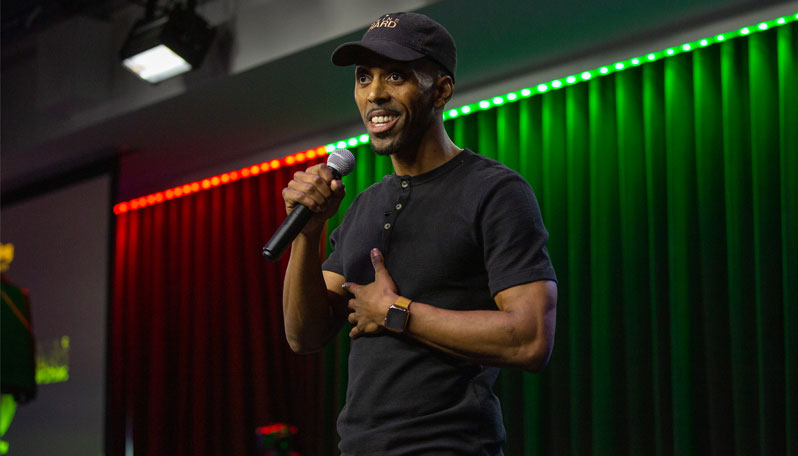Meet Our Editors: Jamie Rosenstein
Editor’s Note: We’re presenting Q&As with the team behind Accelerate.withgoogle.com, which is made up of many 20%ers across the company. Google’s 20% Time policy has led to some of the company’s most successful products, such as AdSense and Gmail. Here’s our third installment.
Jamie Rosenstein, one of the first producers and editors on the Accelerate.withgoogle.com team, was born and raised in Lexington, Kentucky. There, she trained in classical ballet for ten years at The Lexington Ballet Company and started an afterschool ballet program at a local elementary school with Ellie Fogg. Jamie earned her Bachelor of Arts in Economics and Psychology from Cornell University and spent a year abroad studying Experimental Psychology at the University of Oxford. In addition to her academic work in England, she was a marketing research assistant at Oxford’s Saïd Business School and also had fun learning about pentathlons by practicing with the team.
Upon graduating from college, Jamie joined Google’s People Operations Rotational program. Jamie onboarded thousands of new employees as Program Manager for the Noogler – "new Googler" – program, and then produced flagship business inclusion events and content as an editor here at Accelerate with Google. More recently, she programmed and administered Google’s company-wide survey to over 90,000 employees while on her current People Analytics team.
I caught up with Jamie to hear about how her experience as an editor and producer at AWG has infuenced other aspects of her work at Google.
What made you want to be a part of Accelerate with Google?
I genuinely believe in the mission of the editorial team at AWG, which is to level the playing field for people with unequal access to technology and economic opportunity. Technology has the power to be a democratizing force but that is only if everyone 1) has access and 2) knows how to use it.
Google is always striving to make technology accessible, and the Accelerate with Google editorial platform helps people learn how to use technology in inclusive ways through our published stories. I love learning about peoples’ journeys, understanding their challenges, and ultimately packaging their learnings to help and inspire others. Accelerate with Google content taps into the power of seeing yourself represented – in technology, in the media, in leadership positions – in anything you want to do, no matter who you are. There is value in having role models who have overcome similar challenges, and there is value in being able to learn from their experiences. Accelerate with Google shows that people are capable of achieving whatever they put their minds to – no matter their background.
What do the concepts of product and business inclusion mean to you?
Product and business inclusion means building and designing with everyone, for everyone. This may sound lofty, but there is so much value in getting many different perspectives in all stages of business and product development. We often say it’s the right thing to do – because it is – but it is also better for business outcomes. Living out the values of product and business inclusion motivates companies to find gaps in the market, and to build a solution for underrepresented groups. This often leads to a better product overall. I point this process out not to diminish the importance of developing solely for underrepresented communities, but also to demonstrate how there are often positive consequences.
For instance, take curb cuts in sidewalks. While they were designed to allow people with wheelchairs to access sidewalks, how many times have you benefited or seen someone benefit from one when using a roller suitcase or stroller?
Moreover, within tech, voice recognition represents another example. While voice recognition was initially designed for those with vision impairments, it is now creating an entirely new way for everyone to engage with technology. For example, Google Assistant can be helpful for anyone – when we’re driving, in a different location from our device, or simply have our hands full.
In addition, the product inclusion work with Google camera has ultimately created a better product for everyone because the camera now has powerful features such as better proximity sensors and better night photos.
I’ve learned about so many examples of the power of inclusive business practices through editing and producing Accelerate with Google content, such as when I produced a Q&A with Mented Cosmetics founders KJ Miller and Amanda Johnson, and hosted an event with them at YouTube. These impressive women built a company by designing cosmetics with all skin tones in mind. Nude lipstick should not be made in one shade because people are not all in one shade.
Nobody should be an afterthought in any industry.
What is your favorite part about working on the Accelerate with Google team?
The people! Both the people at Google on the Accelerate with Google team, as well as the people whose stories we share. I feel honored to be able to elevate this important work. From my experience, I’ve found that many challenges are due to lack of awareness rather than malintent. Therefore, if I can contribute by exposing gaps and highlighting lessons learned, hopefully one day there will be no need for terms like “product inclusion” or “business inclusion” because that will be the norm.
Image courtesy of Jamie Rosenstein
Contact Us
Stay in touch. We want to hear from you. Email us at Acceleratewithgoogle@google.com
Please note that this site and email address is not affiliated with any former Google program named Accelerator.



